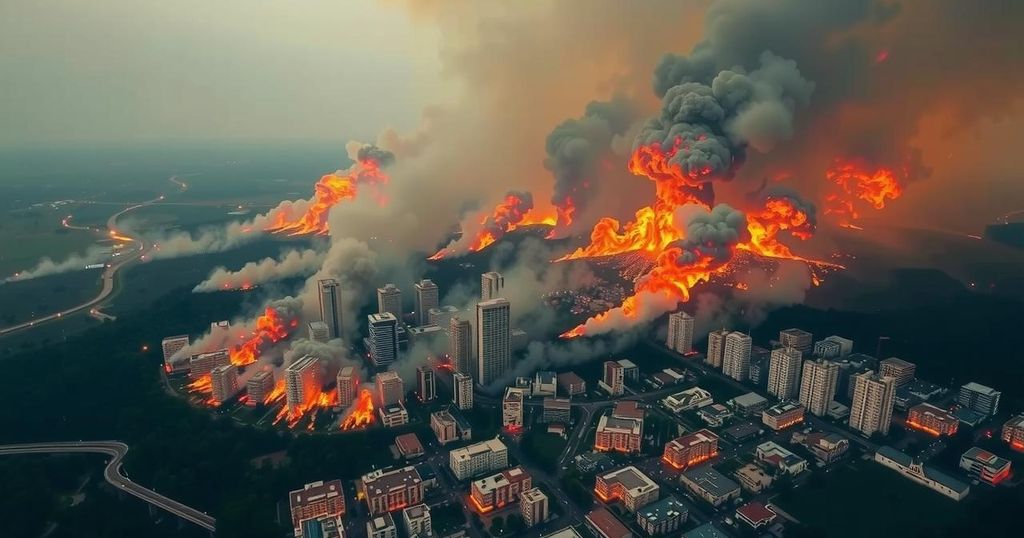Wildfire Smoke Pollution: A Deadly Consequence of Climate Change Exacerbated by Global Heating
New research suggests that global heating may lead to an additional 12,000 deaths annually due to smoke from wildfires. Areas impacted include Australia, South America, Europe, and Asia. While anthropogenic activities have reduced total burnable land by 19%, climate change has increased it by 16%. Studies emphasize the health risks posed by PM2.5 particles from wildfire smoke, with nearly 100,000 deaths per year attributed to such exposure. Understanding these dynamics is essential for public health strategies moving forward.
Recent research indicates that smoke pollution from wildfires, exacerbated by global heating, may be responsible for approximately 12,000 additional fatalities annually. As global temperatures rise, the frequency and intensity of wildfires are increasing, thus affecting regions such as Australia, South America, Europe, and Asia’s boreal forests more significantly. A study published in the journal Nature Climate Change conducted by Dr. Chae Yeon Park and collaborators from various nations revealed that from 2003 to 2019, global heating had elevated the burnable area of land by nearly 16%. Conversely, anthropogenic activities like deforestation for agriculture and urbanization had reduced overall burned areas by 19%. The investigations highlighted that while climate-induced factors such as elevated temperatures and decreased humidity heightened wildfire risks, other human interventions mitigated fire spread, complicating the assessment of climate change’s role in wildfires. The researchers utilized three models of global vegetation and fire to delineate these effects. The findings demonstrated a marked increase in mortality due to PM2.5 exposure from wildfires, which are tiny particles that can infiltrate the pulmonary and circulatory systems. In the 2010s, an estimated 100,000 individuals succumbed annually due to such exposure. The consequences of wildfire smoke are notably dire. According to Professor Hilary Bambrick of the Australian National University, many Australians experienced extended periods of hazardous smoke exposure during the devastating black summer fires of 2019 and 2020, resulting not only in immediate fatalities but likely long-lasting health repercussions. This study underscores how climate change adversely impacts public health and emphasizes the necessity of understanding these implications for effective future planning. Additional research from UK and Belgian scientists further corroborates these findings, illuminating how climate change has been instrumental in escalating wildfire occurrences in Australia, Siberia, and African savannas. Seppe Lampe from Vrije Universiteit Brussel noted that while human interventions somewhat curtail burn areas, the influence of climate change remains dominant and growing. Professor Wim Thiery emphasized the alarming trend, stating that the rate at which climate change increases the area subjected to burning is “increasing every year.”
As climate change continues to drive erratic weather patterns and elevated temperatures, wildfires are becoming more frequent and severe across the globe. These intense fires produce significant amounts of smoke that contain harmful particulate matter such as PM2.5, which poses severe health risks to humans. Efforts to mitigate wildfire risks, such as land management and deforestation, demonstrate an interplay of human intervention and natural climate processes that complicate understanding the total impact of climate change on wildfire prevalence and the associated public health risks. Therefore, studying these factors is critical to inform health policies and environmental strategies aimed at protecting the public from the growing dangers posed by wildfires.
In summary, the alarming increase in deaths attributed to wildfire smoke pollution highlights the urgent need for a multifaceted approach to combat the impacts of climate change. As the research suggests, global heating not only intensifies the risks associated with wildfires but also contributes to significant health hazards from smoke inhalation. This underscores the necessity for concerted efforts to understand and mitigate both the environmental and health implications of climate change-induced wildfires for the benefit of public health globally.
Original Source: www.theguardian.com




Post Comment